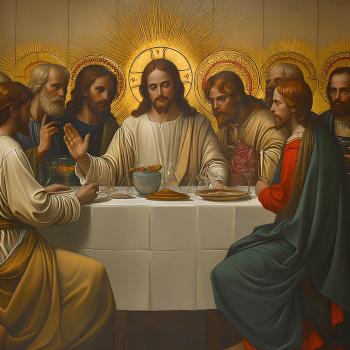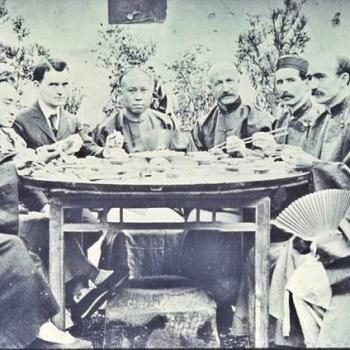Dave Donaldson, co-editor of CityServe and co-founder of CityServe international is tackling an important mission.
Last year, in response to the growing spiritual, mental and social needs in communities across the country, Donaldson teamed up with a group of Christian leaders to launch a powerful initiative, CityServe International. The goal is to provide faith-based solutions and community outreach initiatives to transform local communities. Through the local church, business and government, CityServe served more than one million people in 2018, along with helping believers compassionately live out the gospel of Jesus Christ in their communities.
Now, CityServe’s co-founders have compiled their models, principles and strategies into a new book, CityServe: Your Guide to Church-Based Compassion. Donaldson took the time to answer a few questions about church-based compassion and some of the key issues facing the church. These eye-opening responses will help you see leadership, ministering and the role of the church in a whole new way.
How does one become a selfless, unity-promoting leader? What are the steps?
I like to call these kind of selfless, unity-promoting leaders “for-prophet” leaders. Leaders who embrace their role in what God prophesied in Isaiah 58, to “rebuild the ancient ruins” and “raise up the age-old foundations.” There is such a need for leaders in the church to step into this role and be catalysts in the community for restoration, healing and growth. Here are the “7 R’s” I have found in becoming a “for-prophet” leader within your church or community, which are outlined in more detail in my chapter.
Research: Start with research. Educate yourself about your community’s pressing needs, expertise and resources. Asking questions and doing research are great ways to build unity and connection with community leaders instead of coming in as the person with the “plan.”
Relationships: Second is building relationships. Influence in a community always moves at the speed of relationships. There are no shortcuts to spending quality time with other pastors and leaders in the community!
Representation: Third is representation. “For-prophet” leaders see themselves as representing God’s Kingdom, not their own. This will free you up to honor, celebrate and even elevate other leaders and ministries around you so everyone moves forward.
Results: Fourth, is results. Promote your program or ministry based on what it does and the desired benefit or outcome to the community.
Resources: Fifth, pursue government resources, like grants, to bring in outside money to fund your initiatives in the community.
Recognition: Sixth is recognition. Lead your church and community in recognizing and honoring stakeholders who work tirelessly to improve the lives of others, like government officials, job providers, police, teachers, and other unsung heroes.
Replication: The final point is replication. Research, develop and prayerfully create programs and initiatives around models. Don’t just throw resources at causes. I have found talking to experts like Bill High, CEO of the Signatry, that donors especially want to see your programs as creative, sustainable and solution-minded models with a vision to change the future of those you are seeking to help.
I believe instituting these aspects of a “for-prophet” leader will set-up you up for rich relationships and partnerships in order to make a lasting difference in the community.
What are the 5 sacred roles only the church can play in your community? How do these roles impact the community for good?
Wendell Vinson, the general editor of CityServe along with myself, wrote, “The church, no matter how humble it may seem, represents God’s infrastructure and agency of hope for its community” (CityServe 26). A resourced, empowered and engaged church is the most powerful force in the community because I believe it fulfills these five sacred roles:
Jesus Followers. As Cary Summers put well, “Jesus is our ultimate model” (CityServe 75). Anyone can be moved in a moment by empathy, possibly even compassion, but it takes an intimate relationship with Jesus to be motivated by love, day in and day out. Jesus is our ultimate model who gave everything because “God so loved the world.” Only the church possess that deep, sacrificial kind of love that extends to our family, friends, strangers and enemies. Government is filled with many followers of Jesus, but as an institution it is trying to provide faith without hope. Hebrews 11:1 clearly tells us that the root system of hope is faith in Jesus Christ. Broken lives and deliverance from addictions requires a changed heart and habits.
Social Justice Advocates. The church possess a high calling to uphold morality and bring justice and help to the orphan, widow and all those that are broken. As Gene Roncone wrote, “The church can serve as a moral compass to help our communities navigate through the dark side of politics, materialism, power, selfishness and sin” (CityServe 49). The church’s sense of calling motivated by love is a powerful force that can truly change the world. The chapter by Doug Green, Pastor of North Hills Church in California, points out how the scripture in Mark that says Jesus was “moved by compassion” could also be translated “Jesus was indignant.” Suffering and injustice should engage our compassion, but also our anger! Green says, “Our righteous anger drives us to righteous action” (CityServe 214). What are the causes and injustices that get you angry? That could just be the call of a righteous God.
Holistic Restorers. Only the church is positioned to bring restoration and healing to the whole person: the spirit, soul and body. At CityServe International, our whole model is to empower the church to take the Gospel of Jesus to people through acts of compassion. Church-run programs, like drug rehab centers, have much greater potential as people’s spiritual, emotional, mental and physical needs are addressed. Only the church can provide an extended family and a continuum of care and discipleship that is holistic. Becoming a new creation is both instant and a process of replacing the old with the new.
Mobilizers. Joel 2:11 says, “Unlimited are the Forces” of God’s army. The church’s identity as a unified body of Christ means there is the incredible opportunity to mobilize hundreds and thousands of volunteers across a community with the same heartbeat of Jesus to love their neighbor. And as people of faith, we don’t just see our communities only as communities of need, but communities blessed with enough talent and resources to meet every need.
Unifiers. There is so much rancor, slander, racism and hate in this world that both creates and fuels division. Many of the chapters in CityServe provide principles and strategies for the church to bring healing and solutions to this divide. But, the church has the responsibility to be the model for unity we hope to see.
I think one of the concerns in the back of our mind with the subject of unity is “how do I work together with people I don’t totally agree with?” I have heard it said that “if everyone agrees, then everyone isn’t thinking.” Disagreements can actually lead to better ideas and solutions when handled correctly. Here is a tool I have used in the past. On a whiteboard or sheet of paper, draw a box that everyone can see and write down all the ideas that have been shared within the box. It is critical to listen until you have written down everyone’s ideas that are important to them. Now ask the group, “which of these ideas can we all agree on?” Work with your team to narrow the list down to the essential ideas and draw another box around what you have agreed on. Then develop an action plan or memo of understanding based on where you can start with the consensus of ideas. Finally, as unity and success is achieved with this initial consensus, you can begin to widen the box to include additional ideas and action plans. Don’t let differing ideas prevent unity and create gridlock. Instead, with humility, welcome the ideas of others as a chance to see viewpoints and perspectives you may have missed so the greatest solutions come to the surface.
Why is it important for churches and faith leaders to minister to other ethnicities? How does a church become more culturally relevant?
All people, regardless of race or ethnicity, deserve to hear the Gospel and be loved by the church. This should be the core value of churches and faith leaders in the community. But, unfortunately, that can be a challenge due to cultural and language barriers as well as conflicting political viewpoints. We have a great chapter by Dan de León who pastors a large hispanic church in California. He dives into the opportunities and challenges surrounding pastors of other ethnicities who desire to reach the Hispanic community. I think some of those principles can be extended to whatever ethnic group you desire to reach. Pastor de León wisely states, “You can learn the language, but you must live the culture. I don’t think you will grow your congregation just by reaching out to these people. You must be one of them” (CityServe 53). He gives suggestions like hiring a Hispanic pastor who knows the language and culture, but you may find other creative ways to be relevant to different cultures and become a friend to those in other ethnicities. We must have wise leaders who can navigate the political climate and racial tension that divides us in order to still love our neighbor and fulfill the heart of God found in Leviticus, “The foreigner residing among you must be treated as your native-born. Love them as yourself…” (Leviticus 19:34).
What are the 4 traits of compassionate leaders?
We have a great chapter by Cary Summers, founding president of the Museum of the Bible in Washington D.C., on “Becoming Compassionate Leaders.” He actually identifies five attributes of compassionate leaders: they listen and are concerned for the condition of others; act on feelings of compassion; wear other people’s shoes; don’t rush to conclusions and rely upon God and recognize His power. He does a great job diving into each one of these areas in his chapter.
What is “Responsible Compassion”?
I would also like to bring up an important theme I find weaves through all of these topics we have discussed: responsible compassion. There are responsibilities both on the giving and receiving end of compassion. Relief must be a part of a continuum of care that leads a person or family towards sustainability. I have seen how endless handouts can erode a person’s self-worth, allow their dreams to die, and create a lifestyle where survival becomes the only goal. CityServe highlights many models that balance giving aid with protecting dignity and a vision for lasting change. For example, a food bank run by Joyce Dexter through Lake City Church in Idaho. They have developed a highly successful model with mandatory life coach sessions, a grocery store style facility and a point system to maintain the dignity of their participants. Effective, creative models like this create a responsible partnership between the giver and receiver towards a goal of true restoration. Marvin Olasky, author of The Tragedy of American Compassion, states, “Aid given with ‘no strings attached’ and ‘no questions asked’ may feed the ego of the giver… but it can often hurt more than it helps.” There are dire situations where government assistance and relief aid definitely have their place, but this does not eliminate the responsibility of the faith community to come alongside these programs and provide long-term solutions. Another aspect of responsible compassion on the side of the giver is doing research so resources and finances are given toward organizations that have core values for what we have been discussing. In the end, transformation does not solely lie upon us developing effective and responsible programs, but connecting people with the “God of all hope” who can move hearts towards transformation from the inside out.
Excerpts taken from CityServe: Your Guide to Church-Based Compassion. Copyright © 2019 by Dave Donaldson. Salubris Resources. Visit www.cityservebook.com for more information.














